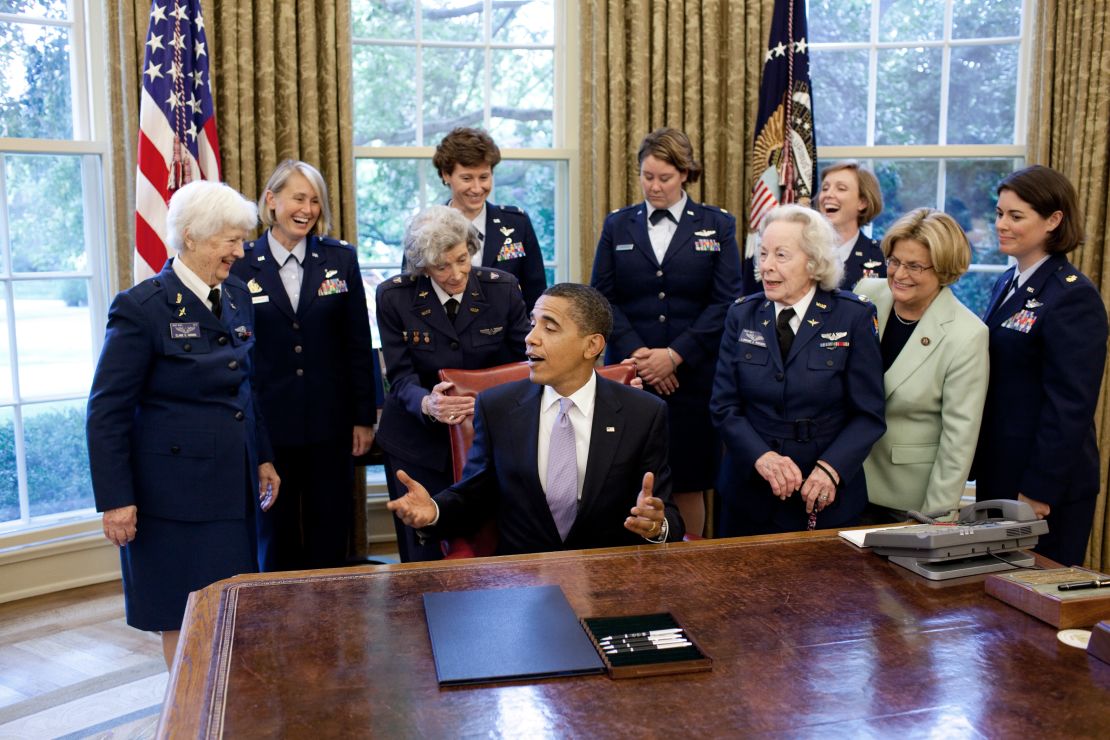There are 19,622 airports in the United States, according to the FAA. And not a single major airport is named for a woman of color.
But if Tiffany Miller gets her way, that could change.
Miller and her family are behind a grassroots campaign to rename Oakland International Airport in California after Maggie Gee, a pioneering female aviator and member of the Women Airforce Service Pilots (WASPs) during World War II.
While there are some regional airports and airfields named for women in the United States – including one named for Jacqueline “Jackie” Cochrane, director of the WASPs, in Riverside, California – there is not a single commercial airport (with a capacity of more than 10,000 passengers a year, and with paved runways) named for a woman.
Gee grew up in the Bay Area and had deep connections to the community. She spent many afternoons with her family watching planes take off and land at Oakland International Airport and later became one of just two Chinese-American WASPs. After the war, she became a physicist and worked at Lawrence Livermore National Laboratory.
Miller got to know Gee through her late maternal grandmother Elaine Danforth Harmon, aka “Gammy,” who was also a WASP. The two became close and remained friends after their service.
Gee, who did not marry or have children, was an honorary member of the Miller family and died in 2013.
After Harmon’s death in 2015, Miller, her two sisters, and their mother successfully petitioned the United States Army to have their grandmother’s ashes buried at Arlington National Cemetery with military honors.
Yet Miller refused to end her mission when her grandmother passed. Honoring the WASP legacy became her life’s work.
“There’s no finish line in terms of history. It’s a constant struggle,” she tells CNN Travel. “We need to continue to work on this topic because my grandmother’s not here anymore.”

So, what does it take to actually rename an airport? Janet Bednarek, a professor at the University of Dayton who specializes in aviation history, tells CNN Travel that the process isn’t easy.
“Renaming anything costs a tremendous amount of money, so that’s part of it. There generally has to be a big political reason for doing it,” she explains. One recent example in the United States was when Houston Intercontinental Airport was renamed for President George H.W. Bush in 1997.
Bednarek notes that renaming an airport isn’t as simple as just, say, changing your name on Facebook. It can cost millions of dollars to reprint maps, change signs (at the airport and on highways and roads leading there) and to educate the public about the new name.
As a result, there usually has to be a significant reason for taking on the project. Eppley Airfield in Omaha, for example, is named for the person who donated the money needed to convert the airport into a jetport, making it big enough to handle jets.
“The big airports usually get a name or a name change because there’s a celebrity associated with it,” Bednarek says.
She cites two California airports as examples: Hollywood Burbank Airport (named for Bob Hope) and John Wayne Airport in Santa Ana (Orange County).
Without the backing of a prominent politician or an A-list celebrity, though, it can be tough to rally enough support or cash to rename an airport. Despite her accomplishments, Gee isn’t a household name.
Bednarek suggests that one way to give the campaign traction could be capitalizing on the 75th anniversary of the end of World War II in 2025.

In the past, Hollywood notoriety has helped lesser-known historical figures get their due. “Hidden Figures” and “A League of Their Own” both brought women’s history to the big screen and helped raise the profiles of NASA computers and AAGPBL baseball players, respectively.
Katherine Johnson, who was played by Taraji P. Henson in “Hidden Figures,” was responsible for calculating the trajectory for America’s first trip to space and was awarded the National Medal of Freedom in 2015. Following the success of the film, NASA’s Independent Verification and Validation Facility was renamed in Johnson’s honor.
President Barack Obama awarded the WASPs – as a group – the Congressional Gold Medal for Service in 2009, with both Gee and Harmon among those in attendance in the Oval Office.
Of the 1,074 women who completed training to become a WASP, 38 died while serving their country. They did this despite facing sexism and racism – and being paid less than their male counterparts. Ironically, one of the WASP responsibilities was training some of the male pilots whose work would outshine theirs.
This is a reflection of the aviation industry as well. Less than 2% of all pilots registered around the world are female.
“The lack of representation of women in the public sphere perpetuates a misperception that women haven’t done anything important in our history,” Miller says.
“Ten million people a year come through the Oakland airport, and that’s 10 million people a year who we have an opportunity to teach. The name Gee could be just as American as Kennedy and O’Hare.”
Miller recently met with Bryant L. Francis, director of aviation for the Port of Oakland.
“[He] told me that they are absolutely not open to considering a name change at this time,” Miller says. “He said that they need to remain focused on building the business at the airport and don’t want to distract from that goal.
According to Miller, Francis “offered to at least look into the possibility of naming a facility, like a terminal, after Maggie Gee or putting together a display in one of the terminals honoring multiple aviators with a local connection.”
A spokesperson for The Port of Oakland said the airport disagrees with Miller’s characterization of events and declined further comment to CNN Travel.

